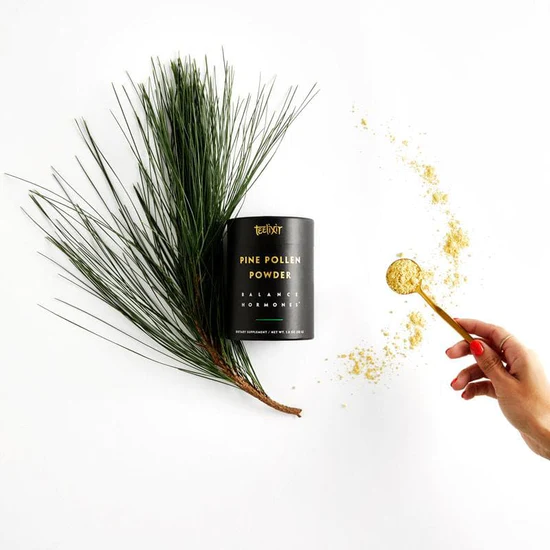Pine pollen is one of the newest superfoods to hit the scene, and it certainly can provide some serious health benefits. Pine pollen benefits are well known these days in the “superfood world” as a nutritive tonic adaptogen powder obtained from various species of pine trees and consumed as a dietary supplement.
Containing both testosterone and DHEA, as well as naturally boosting the antioxidants glutathione and superoxide dismutase, pine pollen can be extremely helpful in boosting both endocrine and immune functions.
Many types of pine trees grow around the world, but one thing they have in common is that they all emit pollen, tiny grains in the male cones that produce powdery yellow dust designed to blow many miles away from your home location.
Containing significantly high amounts of testosterone as well as a complex of other androgens and phytosterols, pine pollen in Australia is known to help balance the relationship between sex hormones, androgens, and estrogens.
The pollen is considerably more potent as an extract when taken for these purposes, and is especially useful for middle-aged adults, ages 40-50, and the hormonal fluctuations that occur with age. Both men, like women, generally by the age of 50 produce significantly less testosterone, this is especially true after andropause and male-female menopause.
Furthermore, we are all subject to toxins in the environment that produce estrogen-like qualities linked to a host of health problems including fertility problems, benign fibroid growths, and breast cancer. Consuming androgenic foods, such as Pine pollen helps balance these higher amounts of xenoestrogens.
In general, pollen extract is not recommended for children and should be avoided by adolescent males, who on average naturally produce healthy amounts of testosterone.
What Is Pine Pollen?
There are about 175 species in the genus Pinus and in the family Pinaceae, all of which produce pollen.
Most commercial pine pollens are from Pinus lamassoniana or Pinus sylvestris species. Pines are generally monoecious, meaning they have both male and female cones on the same tree.
Pine Pollen supplements
Pine pollen supplements that are made from the pollen of Pinus sylvestris (Scots Pine) trees are commonly used for hormone balance problems in both men and women.
Pine trees are members of the genus Pinus. There are more than 170 different species of the genus.
Pine tree leaves, resin (pitch), nuts, inner bark, and pollen have been widely used for centuries for food and medicine
In traditional Asian medicine, people have been using pine pollen for over 2,000 years to support nutrition, immunity, energy, and longevity.
Pine pollen supplements are used today for hormonal balance, energy, sexual health, stamina, and cognitive health.
Pine pollen supplement is typically made from wild harvested pollen from Pinus sylvestris (Scots Pine) and Pinus massoniana (Chinese Red Pine, Masson Pine) in Asian countries.
Contains Balance Androgen Testosterone / Estrogen
Pine pollen offers one of the most potent sources of androgenic substances known in nature’s plant kingdom, made up of the bioidentical steroid hormone testosterone, along with minor amounts of other steroids, including androstenedione, dehydroepiandrosterone (DHEA) and androsterone.
What Is the Broken Cell Wall Pine Pollen?
Pine pollen straight from the tree is a superior nutritious superfood with bioabsorbable components beneficial for health and immune functions. Some companies, however, have found that cell-wall-breaking pine pollen is slightly more nutrient-dense, providing up to 25% more digestibility. Breaking down the cell wall is achieved by a high-velocity airflow spray process that breaks down the cellular matter, making it more bioavailable to the body.
Purchasing High-Quality Pine Pollen
Since China has an entire industry established for the collection and extraction of pollen, this is where most pine pollen products originate. Most of everything is wild collected, so the pollen must come from a clean environment without contamination.








